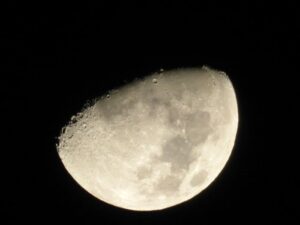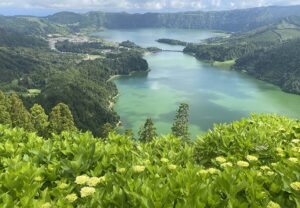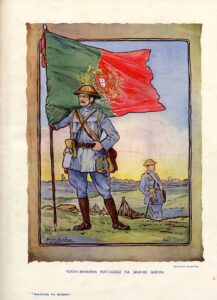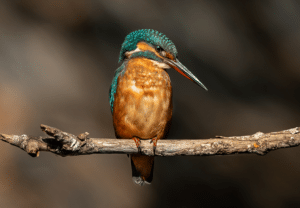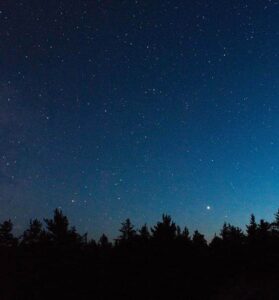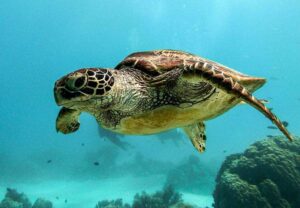Having just come back after a holiday in Somerset and West Wales in a state of suspension between our old life and what years remain in Portugal, there is a hiatus difficult to fill.
From a country green and lush where animals grazed freely and trees staggered under the weight of their foliage, back to drenched farmland dull from months of drought where cattle and horses wear hobbles and farmsteads slowly disintegrate around their occupants.
No doubt jaundiced by air travel, these negative thoughts were soon to be overcome by the powerful perfume of herbs, eucalyptus and Cistus emanating from the little hills of Monchique behind our house.
Departing Faro early on the 22nd, we landed at Bristol and picked up a hire car with only 20 miles on the clock. Large, white and luxurious, its dashboard was a mass of red lights, the steering wheel hung about with knobs and buttons, the car totally electronic. The Boss paid up and we were sent on our way with a full tank and minimal instruction.
With a will of its own, the engine cut out when stopped in traffic and on the motorway occasionally refused to answer the accelerator. Just outside Port Talbot it chose to stay at 20mph. The Boss was driving on the motorway in the outside lane in heavy traffic, but managed to ease across to the hard shoulder before trickling down an exit lane into a ‘No through Road’ cul-de-sac. That was at 5.15pm in the middle of a thunderstorm.
As instructed, we ‘phoned the AA which said it would be out shortly. An hour later, we called again to be told the car was not registered with them. We were keeping in touch with our daughters and No.2 decided to ‘phone Cardiff.
Apparently she gave the AA a tremendous rollicking which then promised to be with us “within the hour”. Finally, at 7.30pm an apologetic mechanic arrived, reprogrammed the car’s computer, road tested it with us on board and sent us on our way after explaining to the Boss the complexities of the bells and whistles that kept it going.
Already tired and hungry after a wait of over three hours marooned by heavy rain in a dead end to nowhere, we reached our destination at 11.30pm.
During 10 days in Pembrokeshire, which was looking at its best, the sea was tranquil, beaches deserted and family reconnected after a year apart, and only one wet day.
Back in the Algarve, everything looked in good order when we arrived home, a heavy thunderstorm having stripped the land round the house of its shallow rooted weeds.
Being September and the Autumn Equinox, the nearest Sunday to full (Harvest) Moon was on September 30 and in Luz at the Catholic Church of Nossa Senhora da Luz, a full congregation celebrated Harvest Festival led by Father John.
Offerings of foods for distribution among the many impoverished people of the area were laid at the foot of the altar.
Dating back to medieval times and originally called Lammas, the first wheat harvested was made into loaves by the early farmers and donated to their local Church for use during Communion in a special Mass to thank God for his goodness.
The practice ceased when Henry VIII broke away from the Catholic Church but decoration with farm and garden produce continued into the 20th century, especially among farming communities.
Unfortunately in Britain and Algarve there is little to celebrate, the UK having been awash for nearly 12 months and the south of Portugal burned to a crisp.
With hay not yet cut and mouldy corn crops lying blackened in the mud, some British farmers will go bankrupt and others will be hard put to feed their livestock this winter.
Cropping the land has virtually ceased in our area of Barlavento and where seed was sown, much that sprouted never came to anything.
Today’s climate change is a fact of life accelerated by human proliferation, and also by volcanic eruption as well as other natural triggers.
Permafrost, which is located mainly in high latitudes, is just one which, for thousands of years, has absorbed carbon dioxide from the atmosphere. If it thaws sufficiently, those bacteria present in the soil can digest the organic matter trapped, thus releasing carbon dioxide and methane back into the atmosphere.
Meanwhile, we enjoy the present and look back to the holiday in Wales with delight, hoping to return next spring before our travel insurance runs out. High among the list of places to revisit is Pembroke Castle, which attracts a wide variety of birds. Almost surrounded by tidal water from Milford Haven and partly divided by the town road bridge to form a pond, it is home to a swannery of about 60 birds.
There is a wide variety of ducks, coots, cormorants and other water birds but one in particular, Hannibal the cannibal, is well known for his murderous habits.
Two years ago he slaughtered at least 15 and injured a further 22 swans that dared to join him and his family in the millpond.
The last I heard was that this year he has finally met his match when another bird broke his right wing. Now in a Swan Rescue Centre, after various tests have been carried out to find the cause of such aggressive behaviour, he will be transferred to another place when fit.
|| features@algarveresident.com
Margaret Brown is one of the Algarve Resident’s longest standing contributors and has lived in the Algarve for more than 20 years.


